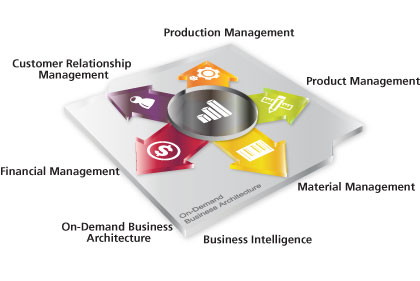Benefits of using ERP solutions as cloud–based services
An ERP cloud is also known as enterprise resource planning using cloud computing which is one of the major ways a new business that provides an approach as Software as a Service, which can ensure continued growth and increasing profits as time goes on. This unique way of organising a business focuses on a modular, consistent management of information across an entire organisation or business.
Many new entrepreneurs form their first business around their area of expertise, and may in fact be highly skilled within that area, but may also be unprepared for day to day management of growing business. Such an entrepreneur may find that as their business increases in size, inconsistencies can pile up as well.
The number one reason why such inconsistencies may happen is that as a business grows, a number of different software may be used in order to manage various areas on information within a business, for example, such as finance, human resources, various supply chain management tasks, as well as payroll and fixed asset and cash management.
Such multiple kinds of software can make it very challenging for a growing business to manage some very technical administrative reasons. In fact, many newer owners make the mistake of continually patching up issues as they crop up, hiring various experts and buying newer and newer types of software.
It is precisely for this kind of a situation that enterprise resource planning was designed to handle. Originally a software process developed for the biggest of international conglomerates, this type of software has been in recent years geared and rebuilt with smaller and growing businesses in mind, in order to be available and useful to many new clients.
In fact, as such businesses may not have the space or large sums of money to pay upfront for an entire retooling of their existing information management systems. For that reason, this type of enterprise resource planning software is also designed to work in a special and growing way of storing management via an ERP cloud.
The advantage of this particular type of computing is that it does not require retooling of the client’s physical systems at all because the data required is stored centrally at a dedicated server that does not need to be hosted in the building where the target business is located at all. In fact, with this type of computing, the client business may only need to have a dedicated internet line.
Since this type of computing means that data is stored in one location and not in the business of the client at all, convenience is at a premium as this type of computing is particularly well suited for the business owner who may not have much technological expertise, as well as not much of a budget to hire such experts or to retool the way the business’s own hardware. Furtermore, in this approach all software might be availale as on-demand concept and there is a flexible schemes of payments for this model.
Example of on-demand service architecture

When it comes to running a growing business, ERP cloud may be more of a necessity than a luxury. A growing business has specific needs if it is to remain profitable and remain successful.
 Nikita Korchin
Nikita Korchin

 Loading…
Loading…
Svetlana Tyan
I suggest that this model suits the company that has ERP as the only Information System. It calls to the notion that ERP seeks to “integrate the complete range of a business’s processes and functions in order to present a holistic view of the business from a single information an IT architecture” (Klaus et al, 2000).
New enterprises, particular those positioned as E-business, are more likely to adapt ERP Cloud.
Although the Cloud promises “to change the face of IT”, a move to Cloud faces resistance from IT managers, especially in organisations with multifunctional, complex, strategic, integrated legacy system.
Sources:
1. Klaus, H., Rosemann, M. & Gable, G. G. (2000) What is ERP? Information Systems Frontiers, 2 (2): 141
2. www.kpmg.com/IN/en/IssuesAndInsights/ThoughtLeadership/The_Cloud_Changing_the_Business_Ecosystem.pdf [Accessed: 06.04.2012]
3. Thibodeau, P.(2011) ‘Server Huggers’ Slow Cloud Adoption, Computerworld, 45 (23): 6
06 Apr 2012, 23:26
Senkun Xiang
Additionally, I think one of the benefits of using ERP as cloud based services is that organizations do not need to worry about disaster recovery.
However, as other cloud based services, I think security and privacy might be the issues that makes organization hesitate about using cloud based ERP system.
29 Apr 2012, 23:55
Add a comment
You are not allowed to comment on this entry as it has restricted commenting permissions.